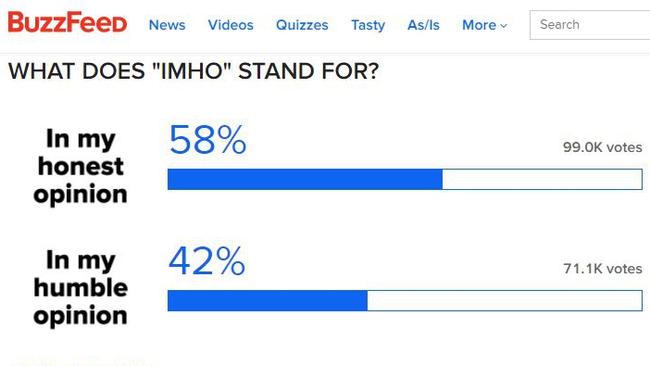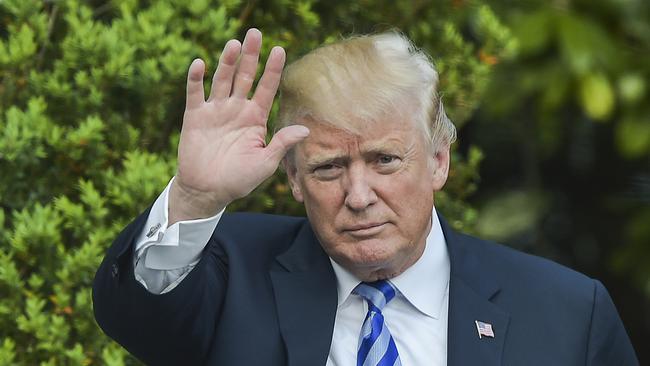The stunning victory that shows humility is vanishing
AN online dispute tells us everything we need to know about our narcissistic age. Is it any wonder when we see rewards going to those whose self-belief outweighs their actual ability, asks Miranda Devine.
Rendezview
Don't miss out on the headlines from Rendezview. Followed categories will be added to My News.
A FIERCE internet dispute which erupted last week over the meaning of the social media abbreviation, IMHO, tells us everything we need to know about our narcissistic age.
In my humble opinion, the H in IMHO means ‘humble’.
But, wouldn’t you know it, the selfie generation thinks the H stands for honest, as in ‘In My Honest Opinion’ a phrase which lacks the comedic nuance or tangential morality of the original.
Buzzfeed posed the question last week in an online poll after its staffers couldn’t agree on the meaning of IMHO. They asked if it means “in my humble opinion” or “in my honest opinion.”
After totalling 170,000 votes, in a stunning victory for ignorance and short memories, honesty was chosen over humility, 58 to 42 per cent.

Now, the phrase ‘in my humble opinion’ has been in common usage since at least Roman times, when it was ‘Ut humiliter opinor’.
It was popular in the Victorian era and found frequently in such publications as The London Literary Gazette of 1841 and the report of the 1855 Royal Commission into the College of Maynooth in Ireland.
It is often used ironically, and sometimes as originally intended, to soften dogmatism, as in ‘this is my opinion, although I may be wrong’.
And, since the dawn of the internet age, the phrase has been abbreviated as IMHO. That’s how IMHO been defined in the Oxford English Dictionary since 2011.
It’s probably not so surprising that the Buzzfeed audience got it wrong, since they mostly are Millennials brought up on a diet of brash egomaniacs. They see rewards go to narcissists whose self-belief outweighs their actual ability, while humility is derided as a quality of losers. Whatever else you think of Donald Trump, he is not known for self-effacement.
To be honest, their redefinition of IMHO isn’t even ignorance since English is a language which evolves and adapts to reflect the culture.

And what IMHO tells us about our culture is that the concept of humility is vanishing fast, especially among the young.
In a survey which surprised researchers writing last year in the Journal of Positive Psychology, a majority of American students in Years 5 and 6 saw humility as a negative attribute. They “talked about highly humble people as being embarrassed or otherwise feeling badly about themselves … as having suffered hardship, and as being sad, lonely, or shy.”
Maybe the children are too young to understand the value of humility. Or, more worryingly, humility just has disappeared from their lives.
Yet it is the foundational virtue, without which good character and healthy societies struggle to exist.
If there were one thing we could do to improve ourselves and the social wellbeing of our communities, it would be to relearn the importance of humility, which is the understanding that you are not the centre of the universe, not all-knowing, or all-powerful. It is the ability to have an accurate opinion of yourself and see your own inadequacy with clear eyes. Humility protects you against hubris, of the kind that has brought masters and mistresses of the universe to their shame before the banking royal commission.
At least the adults surveyed In that paper, “The psychological significance of humility”, in the Journal of Positive Psychology, praised it as, “an awareness of being part of something larger than oneself, of being just one among others that are equal to oneself … a lack of desire to self-aggrandize or self-promote; a modesty in self-presentation and/or lifestyle … the recognition of the value of others … kindness and compassion.”
Other research has found humility correlates with lower rates of infidelity as well as greater psychological wellbeing and character strengths, including empathy, optimism, hope, positive growth, decisiveness, and comfort with ambiguity.
Other studies have found humble people have closer ties with friends, family, and romantic partners, exhibit more civic responsibility, gratitude, integrity, benevolence, mindfulness, conscientiousness, and “the tendency to feel guilt for bad behaviour and seek to repair wrongdoing”. Humility reduces conflict over status, and associated envy. It is a “consistent and robust predictor of generosity”.
In other words, it’s good for us all. So, let’s put the humility back into IMHO.



